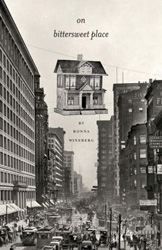Ronna Wineberg is the author of On Bittersweet Place, her first novel, and a debut collection, Second Language, which won the New Rivers Press Many Voices Project Literary Competition, and was the runner-up for the 2006 Reform Judaism Prize for Jewish Fiction. She will be blogging here all week for Jewish Book Council’s Visiting Scribe series.
 Chanukah is here again. The holiday’s arrival reminds me of the sweetness of celebrations when I was a child and when my children were young. Chanukah is also a reminder that another year has passed, a marker of time, and a reminder of the winter darkness that lies ahead. The glowing candles seem like hopeful beacons in the harshness of winter.
Chanukah is here again. The holiday’s arrival reminds me of the sweetness of celebrations when I was a child and when my children were young. Chanukah is also a reminder that another year has passed, a marker of time, and a reminder of the winter darkness that lies ahead. The glowing candles seem like hopeful beacons in the harshness of winter.
When I was a child, we celebrated the holiday with our large extended family. My mother’s parents, older siblings, aunts, and uncles were born in Russia. The sounds of our celebration were a mix of English spoken without an accent, with an accent, and Yiddish. The children were given gifts, usually what we needed: a new winter coat, a wool sweater and socks, sometimes a decorative piece of clothing like a blouse or colorful scarf. The presents were utilitarian, but the celebration was joyous with scents of latkes filling the house.
In school, of course, Christmas was the dominant holiday. A few progressive teachers spoke about Chanukah and displayed a menorah. We didn’t know about Kwanzaa then. My children celebrated all three holidays in school; each holiday was given equal weight.
For the characters in On Bittersweet Place, who live in Chicago in the 1920s, Chanukah has a similar meaning but is also a stark reminder of their otherness. They are immigrants, strangers in their new land. Today’s immigrants are strangers, too, and still need to overcome the same obstacles the Czernitski family faced: learning a new language, finding work and housing, understanding a new culture, and dealing with prejudice. No amount of desire for assimilation can help immigrants feel comfortable with certain customs.
Lena feels her otherness even more strongly during the holidays, feels the precarious balance between her two worlds. Her teacher leads the class in Christmas carols and reads aloud Christmas stories.
Here is a scene that did not fit into the book. Although I liked this scene, I felt it didn’t move the narrative forward in the way I’d hoped, and so I didn’t include it in the novel. Lena hurries home after singing Christmas carols at school and walking past the Christmas tree displayed in the school hallway. She feels dejected. She didn’t know the words to the carols sung at school; her otherness has been exposed. The small apartment on Bittersweet Place is filled with the familiar smells of latkes. This is the same smell that lingered in the house when I was a child and when my children were young. The simple copper menorah sits on the ledge of the Czernitski kitchen window. Blessings are sung; candles are lit, flicker and glow. Small presents are given. Lena’s mother Reesa distributes the gifts, which are not wrapped. She wears a yellow apron over her blue cotton dress; she has been cooking. Lena’s brother Simon receives a red wool hat, Lena a pair of black wool gloves, thick to withstand the winter cold. Reesa gives nothing to her husband Chaim. She prefers to save money and use it for what the children need. But she prepares a favorite sweet for him, egg kichels. He brings her a single yellow rose, bought from a flower shop, an extravagance and uncharacteristic gesture of tenderness.
The holiday is a repository of memory for the Czernitski family and, perhaps, for every family, especially immigrants. Year after year we celebrate with the same foods, melodies, and prayers. Those with whom we celebrate, changes. Children grow up and move away, people we love become ill and die, we may move from one country to another, but the traditions remain. While Chaim reads the Chicago Tribune at the kitchen table, waiting for the aunts and uncles to arrive, Reesa sits in the living room with Lena and Simon, telling stories about family members who were killed in Russia. Year after year, the same stories, the same names.
For Lena, there is relief when the stories, songs, Christmas carols, Christmas tree, and the pull of the past ends. Reesa sets the menorah on a high kitchen shelf. The holiday is over. Lena can dive into life again and continue on her journey to find her “true nature” and the sense of safety and belonging she hopes for in her new home.
Ronna Wineberg is the recipient of a scholarship from the Bread Loaf Writers Conference and fellowships from the New York Foundation for the Arts and elsewhere. She is the founding fiction editor of Bellevue Literary Review, and lives in New York.
Related Content:
- Reading List: Hanukkah Reads
- What’s New About Hanukkah? by Dianne Ashton
- Happy Merry Christmas, Ma’am! On Being Jewish in a Strange Land by Jenny Feldon



